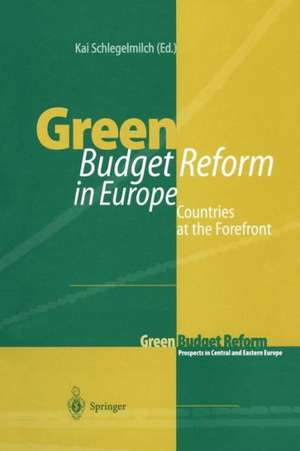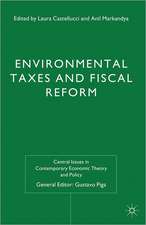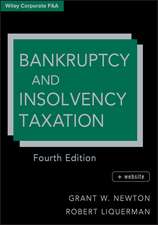Green Budget Reform in Europe: Countries at the Forefront
Editat de Kai Schlegelmilchen Limba Engleză Paperback – 13 noi 2012
Preț: 395.82 lei
Nou
Puncte Express: 594
Preț estimativ în valută:
75.81€ • 78.10$ • 63.50£
75.81€ • 78.10$ • 63.50£
Carte tipărită la comandă
Livrare economică 24 februarie-10 martie
Preluare comenzi: 021 569.72.76
Specificații
ISBN-13: 9783642636769
ISBN-10: 3642636764
Pagini: 480
Ilustrații: XXXI, 443 p.
Dimensiuni: 155 x 235 x 25 mm
Greutate: 0.67 kg
Ediția:Softcover reprint of the original 1st ed. 1999
Editura: Springer Berlin, Heidelberg
Colecția Springer
Locul publicării:Berlin, Heidelberg, Germany
ISBN-10: 3642636764
Pagini: 480
Ilustrații: XXXI, 443 p.
Dimensiuni: 155 x 235 x 25 mm
Greutate: 0.67 kg
Ediția:Softcover reprint of the original 1st ed. 1999
Editura: Springer Berlin, Heidelberg
Colecția Springer
Locul publicării:Berlin, Heidelberg, Germany
Public țintă
ResearchCuprins
I. Green Budget Reform in European Countries -Proceedings of the International Seminar, Slovenia, 1997.- I.1 Introduction to the Green Budget Reform Seminar.- I.2. Opportunities for Increased Use of Environmental Taxes and Charges in EU Member States and CEECs.- I.3. Green Budget Reform: Macroeconomic Impacts and Impacts on Innovation.- I.4. Empirical Assessment of an Energy Tax Proposal for Austria.- I.5. Cohesion Countries: Experience in Countries on the European Periphery.- I.6. Green Tax Reform in Denmark.- I.7. Green Tax Reforms: Some Experiences from Sweden.- I.8. Policies for a Better Environment and High Employment.- I.9. Report on the Concrete Steps of Green Budget/Tax Reform in the Netherlands -Retrospective and Outlook.- I.10. Ecological Tax Reform - What is Happening in Switzerland?.- I.11. Polish Experience with Environmental Fees, Fines and Taxes, and Simulations of Some Economic Effects of Elements of Green Tax Reform Using the Computable General Equilibrium Model.- I.12. Coordinating Environmental and Fiscal Policy in Hungary: Possibilities and Constraints.- I.13. Proposed Modifications to the 1997 State Budget Bill of Hungary Clean Air Action Group/Trade Union of Culture, presented by.- I.14. Economic Instruments and Environmental Funds for Environmental Policy in Central and Eastern Europe.- I.15. Subsidies and the Environment: What Subsidies and Tax Incentives Affect Production Decisions to the Detriment of the Environment.- I.16. Green Budget/Ecological Tax Reform Commissions.- II. Green Budget Reform in Slovenia Case Study Tanja Markovi?-Hribernik, Kai Schlegelmilch.- II.1. Studies on Green Budget Reform and their Relevance for Slovenia.- II.2. Instruments for the Protection of the Environment-i.a. Environmental Taxes.- II.4. Expenditures/Subsidies.- II.5. Concluding Recommendations.- References.- Exchange Rates.- Appendices.- Appendix I: Sales Tax Rates on Oil Derivates.- Appendix II: Subsidies for a Better Environment.- Appendix III: Subsidies Potentially Damaging the Environment.- Appendix IV: Guarantees.- Appendix V: New Approaches to Environmental Problems and the Particular Role Of SMEs.- Integrated Technology.- Least-Cost Planning/Demand-Side Management/Integrated Resource Planing Contracting.- Selling Services Instead of Products.- Small and Medium-Sized Enterprises (SME).- Appendix VI: Macroeconomic Circumstances.- State and Structure of the Economy.- Accession to the EU.- Appendix VII: Fiscal Policy.- Government Revenues.- Government Expenditures.- Fiscal Deficit.- Public Debt.- Labour Taxation.- Appendix VIII: State of Environment in Slovenia.- Sulphur Dioxide.- Nitrogen Oxides.- Carbon Dioxide/Energy.- Transport.- Agriculture.- Quality of Ground Water Standards.- Notes.
Textul de pe ultima copertă
This book on Green Budget Reforms (GBR) provides comprehensive insight into how forerunner countries such as Denmark, the Netherlands, Norway, Sweden and Switzerland, but also Hungary and Poland, have designed and taken first steps toward GBR, with emphasis on Ecological Tax Reform (ETR). The book covers the proceedings of an international seminar held in Slovenia with contributions from economists of the European Commission, the OECD, finance ministries and researchers. It also includes the first comprehensive case study of Slovenia, demonstrating the unique opportunities for GBR in Central and Eastern European Countries in particular. The book is for policy makers, consultants, lecturers, and scientists who wish to make and measure progress in sustainable development. Readers can choose from a range of market-based instruments applied in various countries and adapt them according to the requirements of their countries.
Caracteristici
the first book describing experiences with ecological taxes and subsidies in West-, Middle- and East-European countries - analysis of a budget (revenue, expenditure and guaranties of the government)









